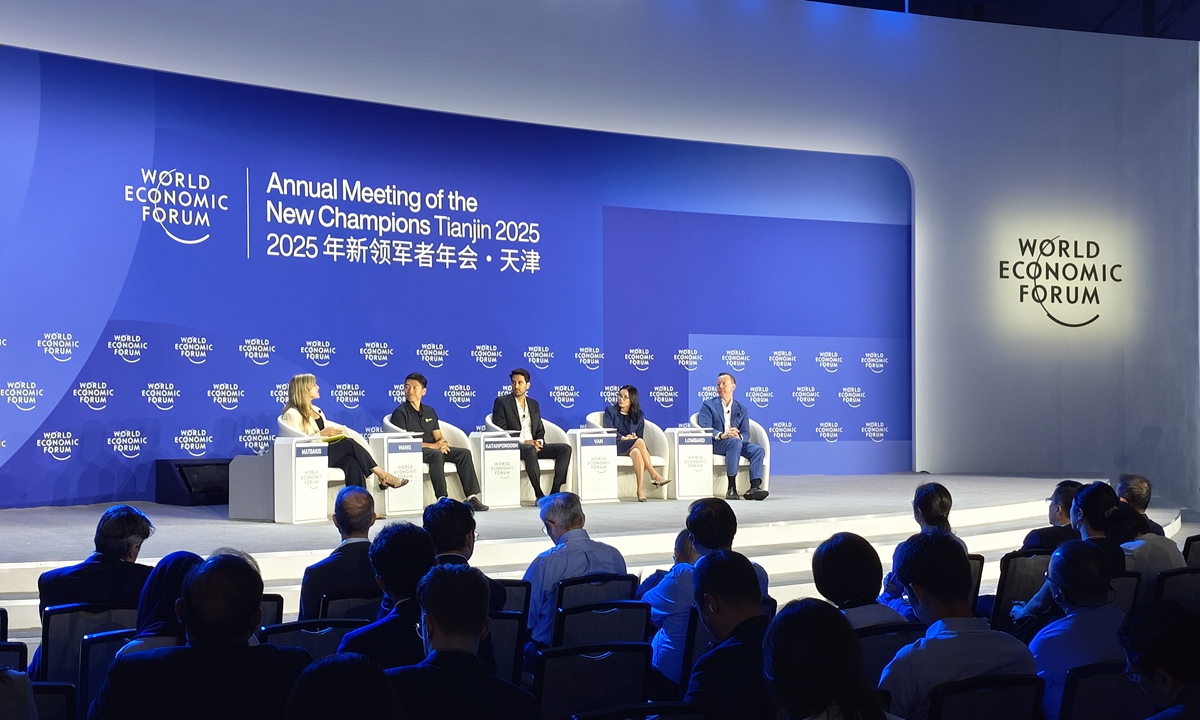
Building an Agentic Economy, a breakout forum of the 2025 Summer Davos Forum, is held in Tianjin, North China, on June 25, 2025. During the session, the attendees were invited to discuss how business models are evolving as AI agents take the lead in building, managing, and scaling companies.
Chinese and foreign private companies are ramping up cooperation and seeking partnerships with their global counterparts with an open mindset at the ongoing Summer Davos being held in North China's Tianjin.
Despite the challenges facing globalization, companies in Davos are actively expanding into overseas markets in line with the policy of further opening-up by China, the host country, setting an example for other countries and businesses to embrace openness, cooperation, and mutual benefit, a Chinese expert said.Themed "Entrepreneurship in the New Era," this year's Summer Davos, also known as the 16th Annual Meeting of New Champions of the World Economic Forum, has brought together about 1,800 participants from more than 90 countries and regions, offering a crucial window into the world's second-largest economy by staging a range of conferences and exhibitions.Chinese private companies, the backbone of the nation's foreign trade, are active participants in this year's Summer Davos. At the forum, they emphasized their commitment and strengths in expanding globally alongside international partners, aiming to provide meaningful solutions for global development in areas such as home appliances, healthcare, and eVTOL aircraft.Speaking at a roundtable forum at the Summer Davos, Li Dongsheng, founder and chairman of Chinese electronics giant TCL, said that his company has beefed up efforts in going global for win-win outcomes.Since expanding overseas in 1999, TCL has remained committed to its globalization strategy, promoting localized operations abroad to contribute to local economic and social development as well as environmental protection, achieving mutual benefit and shared growth, said Li Dongsheng.Speaking as an industry veteran, Li Dongsheng said that in recent years, there has been a trend of "de-globalization," but for Chinese companies, globalization remains an inevitable choice. China accounts for a key portion of global industrial output, and this share still has room to grow, because the competitiveness of many Chinese companies in manufacturing remains strong.Among the key topics drawing attention at this year's Davos forum are the evolving global trade landscape, how businesses should navigate these changes, and emerging trends in artificial intelligence (AI). These themes also stood out to Gong Rujing, chairperson of Yidu Tech, a leading player in China's AI-driven healthcare sector, who has participated in the forum multiple times. "No matter how the international landscape changes, we remain committed to going global and embracing open collaboration," Gong told the Global Times at the forum.Giving the example of her own industry, she said that the healthcare sector faces a range of challenges such as high costs, complex supply chains, and significant room for improving service efficiency -- issues shared by many countries around the world. As such, China's experience and progress in this area can offer valuable insights, said Gong, giving examples of how AI is playing a key role in improving healthcare efficiency. Gong's company has operations in five countries, including Singapore and Brunei. "This trip to the Summer Davos has also helped us connect with many new business partners as we continue to advance our global strategy and seek win-win cooperation," she said. This is the first time that Xie Ling, CEO of a low-altitude company named Vertaxi, has attended the forum, and he is excited about the opportunities for cooperation.This forum offers a valuable opportunity for international tech entrepreneurs to experience firsthand the strengths of China's industries and the potential for cooperation, Xie said. "From the perspective of industrial development, the low-altitude economy as a strategic emerging industry represents a new growth driver following the rise of new-energy vehicles. Around the world, this sector is still in its early stages, and Davos has given me a valuable opportunity to connect with international peers and explore future opportunities for global collaboration," said Xie.As Chinese companies seek partnerships abroad, foreign businesses are exploring opportunities in the vast Chinese market at the forum."I think it is important to learn more about current hot topics, such as AI and global geopolitics here at the Summer Davos. For me, it is also about gaining knowledge and getting to know more people here," YK Lee, a Group CFO at Qi Group, a diversified multinational entity catering to various business lines in lifestyle and leisure, luxury, training and education, told the Global Times at the forum.In Tianjin, Lee is exploring opportunities for collaboration with Chinese companies. "China is developing rapidly and is basically a world leader now, so it is valuable to understand how people see China and also to help connect China with the rest of the world. I think that is very important."The Davos forum, as a strong platform for international cooperation and opening-up, offers an opportunity for businesses to demonstrate their enthusiasm for global engagement. Their active participation also reflects positive expectations for the future, Li Changan, a professor at the Academy of China Open Economy Studies at the University of International Business and Economics, told the Global Times on Wednesday.No matter how the global landscape changes, businesses vote with their feet and their commitment to openness remains firm, Li said, noting that this also reflects China's broader strategy of opening to the world, and encouraging private enterprises to embrace international competition with an open and inclusive attitude while continuing to open its market to foreign businesses.
